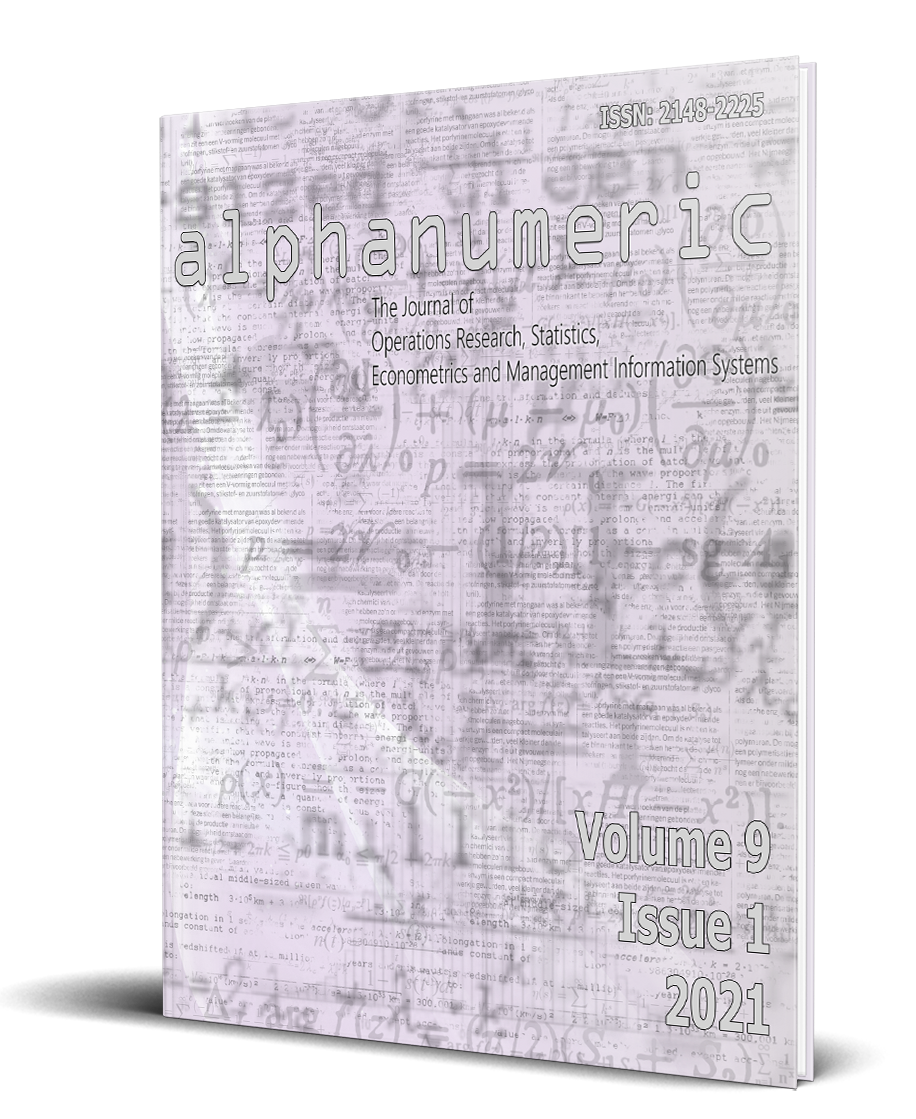
alphanumeric journal
The Journal of Operations Research, Statistics, Econometrics and Management Information Systems
The Econometric Analysis of the Relationship Between Oil Price, Economic Growth and Export In OPEC Countries
Abstract
In countries where the rate of industrialization and growth is high, dependence on oil is constantly increasing. Factors such as the increase in oil reserves of OPEC countries, differences in oil extraction costs, oil supply and demand imbalances cause oil prices to fluctuate. Increases in oil prices in OPEC countries have an increasing effect on energy export revenues and government budget revenues. In an economy dependent on oil export revenues, the existence of new reserves or the increase in oil production changes the structure of the production and export sectors in favor of oil. OPEC countries, which generate income based on oil exports, lose their competitive power in foreign markets when they cannot invest in R&D, technology and productivity. This situation causes countries to have an economic structure dependent on imports, to increase their current account deficit and to decrease their growth rates. The purpose of this study is to examine the relationship between average annual crude oil price (nominal value in US dollars), gross domestic product (2010 prices and $) and exports (2010 prices and $) for OPEC member countries through panel data analysis.
Keywords: OPEC, Oil Price, Panel Data Analysis
Jel Classification: C01
Suggested citation
(). The Econometric Analysis of the Relationship Between Oil Price, Economic Growth and Export In OPEC Countries. Alphanumeric Journal, 9(1), 111-124. http://dx.doi.org/10.17093/alphanumeric.909410
References
- Ağayev, S. (2011). “İhracat ve ekonomik büyüme ilişkisi: 12 geçiş ekonomisi örneğinde panel eştümleme ve panel nedensellik analizleri”. Ege Akademik Bakış, 11(2), 241-254.
- Akıncı, M.,Aktürk, E., Yılmaz, Ö. (2012). “Petrol fiyatları ile ekonomik büyüme arasındaki ilişki: opec ve petrol ithalatçısı ülkeler için panel veri analizi”. Uludağ Üniversitesi İİBF Dergisi, 31(2), 1-17.
- Akıncı, M.,Aktürk, E., Yılmaz, Ö. (2013). “Petrol fiyatları ile ekonomik büyüme arasındaki ilişki: opec ve petrol ithalatçısı ülkeler için zaman serisi analizi”. Atatürk Üniversitesi Sosyal Bilimler Enstitüsü Dergisi, 17(1), 349-361.
- Alagöz, M. Alacahan, N. D., Akarsu, Y. (2017). “Petrol fiyatlarının makro ekonomi üzerindeki etkisi-ülke karşılaştırmaları ile panel veri analizi”. KMÜ Sosyal ve Ekonomik Araştırmalar Dergisi, 19(33), 144-150.
- Bayraç, H.N. (2019). “Küresel petrol piyasasındaki fiyat dalgalanmalarının ekonomik etkileri”. Yalova Sosyal Bilimler Dergisi, 9(19), 44-59.
- BP (2019), BP Statistical Review of World Energy 68th Edition. https://www.bp.com/content/dam/bp/business-sites/en/global/corporate/pdfs/energy-economics/statistical-review/bp-stats-review-2019-full-report.pdf. date of access: 04.12.2019.
- Bouzid, A. (2012). “The relationship of oil prices and economic growth in Tunisia: A vector error correction model analysis”, The Romanian Economic Journal, 15(43), 3-22.
- Elbeydi, K.R., Hamuda, A.M.,Gazda, V. (2010). “The relationship between export and economic growth in Libya” Arab Jamahiriya, Theoretical and Applied Economics, 17(1), 69-76.
- Elmi, Z., Jahadi, M. (2011), “Oil price shocks and economic growth:evidence from OPEC and OECD”. Australian Journal of Basic and Applied Sciences, 5(6), 627–635.
- Ezgi, S., Özkılıç, C. (2016). “Petrol fiyatlarının oluşumunu etkileyen faktörler”. Petro Bülten, TMMOB Petrol Mühendisleri Odası, Sayı:1,18-21.
- Ghalayini, L. (2011).” The interaction between oil price and economic growth”. Middle Eastern Finance and Economics, Issue 13, 127-140.
- Hamilton J. D., (2009).” Understanding crude oil prices”.The Energy Journal, 30(2), 179-205.
- Jimenez, R., Sanchez, M. (2005). “Oil price shocks and real GDP growth: empirical evidence for some OECD countries”, Applied Economics, 37, 201–228.
- Mohsen, N., Asghan, M. (2011). “Natural resource abundance, dutch disease and economic growth in oil economics”. Quarterly Energy And Statistics, Special Issue, 61, 631-652.
- Ulusoy, R., Yazıcı, E., Altun, İ. (2017).“Petrol fiyatlarında yaşanan belirsizlik ve Ortadoğu’da sürdürülebilir büyüme: Ortadoğu ekonomilerinin çeşitlendirilmesi”. Yalova Üniversitesi Sosyal Bilimler Dergisi, 7(15), 31-45.
- Uzuner, M. T. (2018). “Dünya ham petrol fiyatlarının ekonomi politiği üzerine bir inceleme”. Yalova Sosyal Bilimler Dergisi, 8(17), 106-127.
- Yardımcıoğlu, F., Gülmez, A. (2013). OPEC ülkelerinde Hollanda hastalığı: petrol fiyatları ve ekonomik büyüme ilişkisinin ekonometrik bir analizi”. Sosyoekonomi Dergisi, 9(19), 117-140.
- https://www.opec.org, (OPEC Annual Statistical Bulltein 2019) date of access: 15.10.2019.
- http://petroturk.com/akaryakit/opec-petrol-ihracatindan-711-milyar-dolar-elde-etti) Date of access: 04.12.2019.
- http://www.leftlanebrain.com/oil-and-gas-price/ date of access: 04.12.2019.
- http://www.tpao.gov.tr. date of access: 04.12.2019.
- https://www.investopedia.com/articles/investing/102314/understanding-benchmark-oils-brent-blend-wti-and-dubai.asp. date of access: 08.12.2019.
- http://www. eia.gov date of access: 04.12.2019.
2021.09.01.ECON.03
alphanumeric journal
Pages 111-124
Received: April 4, 2021
Accepted: June 24, 2021
Published: June 30, 2021
2021 Çemrek, F., Bayraç, HN.
This is an Open Access article, licensed under Creative Commons Attribution-NonCommercial 4.0 International License.

scan QR code to access this article from your mobile device
Contact Us
Faculty of Transportation and Logistics, Istanbul University
Beyazit
Campus 34452 Fatih/Istanbul/Türkiye
Bahadır Fatih Yıldırım, Ph.D.
editor@alphanumericjournal.com
+ 90
(212) 440 00 00 - 13219
alphanumeric journal
alphanumeric journal has been publishing as "International Peer-Reviewed Journal" every six months since 2013. alphanumeric serves as a vehicle for researchers and practitioners in the field of quantitative methods, and is enabling a process of sharing in all fields related to the operations research, statistics, econometrics and management informations systems in order to enhance the quality on a globe scale.

